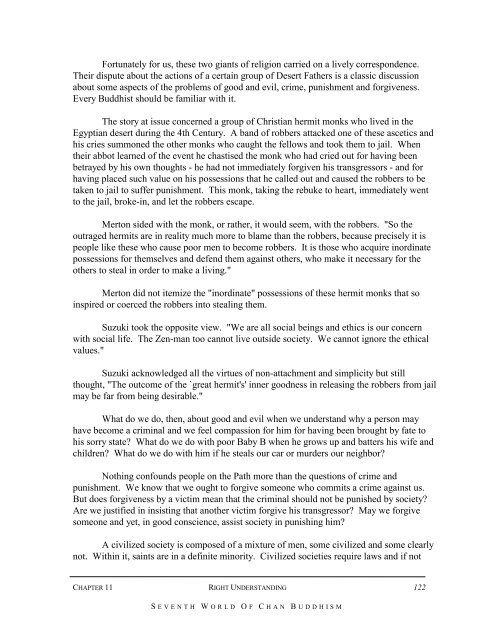seventh world of chan buddhism - Zen Buddhist Order of Hsu Yun
seventh world of chan buddhism - Zen Buddhist Order of Hsu Yun
seventh world of chan buddhism - Zen Buddhist Order of Hsu Yun
You also want an ePaper? Increase the reach of your titles
YUMPU automatically turns print PDFs into web optimized ePapers that Google loves.
Fortunately for us, these two giants <strong>of</strong> religion carried on a lively correspondence.<br />
Their dispute about the actions <strong>of</strong> a certain group <strong>of</strong> Desert Fathers is a classic discussion<br />
about some aspects <strong>of</strong> the problems <strong>of</strong> good and evil, crime, punishment and forgiveness.<br />
Every <strong>Buddhist</strong> should be familiar with it.<br />
The story at issue concerned a group <strong>of</strong> Christian hermit monks who lived in the<br />
Egyptian desert during the 4th Century. A band <strong>of</strong> robbers attacked one <strong>of</strong> these ascetics and<br />
his cries summoned the other monks who caught the fellows and took them to jail. When<br />
their abbot learned <strong>of</strong> the event he chastised the monk who had cried out for having been<br />
betrayed by his own thoughts - he had not immediately forgiven his transgressors - and for<br />
having placed such value on his possessions that he called out and caused the robbers to be<br />
taken to jail to suffer punishment. This monk, taking the rebuke to heart, immediately went<br />
to the jail, broke-in, and let the robbers escape.<br />
Merton sided with the monk, or rather, it would seem, with the robbers. "So the<br />
outraged hermits are in reality much more to blame than the robbers, because precisely it is<br />
people like these who cause poor men to become robbers. It is those who acquire inordinate<br />
possessions for themselves and defend them against others, who make it necessary for the<br />
others to steal in order to make a living."<br />
Merton did not itemize the "inordinate" possessions <strong>of</strong> these hermit monks that so<br />
inspired or coerced the robbers into stealing them.<br />
Suzuki took the opposite view. "We are all social beings and ethics is our concern<br />
with social life. The <strong>Zen</strong>-man too cannot live outside society. We cannot ignore the ethical<br />
values."<br />
Suzuki acknowledged all the virtues <strong>of</strong> non-attachment and simplicity but still<br />
thought, "The outcome <strong>of</strong> the `great hermit's' inner goodness in releasing the robbers from jail<br />
may be far from being desirable."<br />
What do we do, then, about good and evil when we understand why a person may<br />
have become a criminal and we feel compassion for him for having been brought by fate to<br />
his sorry state? What do we do with poor Baby B when he grows up and batters his wife and<br />
children? What do we do with him if he steals our car or murders our neighbor?<br />
Nothing confounds people on the Path more than the questions <strong>of</strong> crime and<br />
punishment. We know that we ought to forgive someone who commits a crime against us.<br />
But does forgiveness by a victim mean that the criminal should not be punished by society?<br />
Are we justified in insisting that another victim forgive his transgressor? May we forgive<br />
someone and yet, in good conscience, assist society in punishing him?<br />
A civilized society is composed <strong>of</strong> a mixture <strong>of</strong> men, some civilized and some clearly<br />
not. Within it, saints are in a definite minority. Civilized societies require laws and if not<br />
CHAPTER 11 RIGHT UNDERSTANDING<br />
S EVENTH W ORLD O F C HAN B UDDHISM<br />
122


